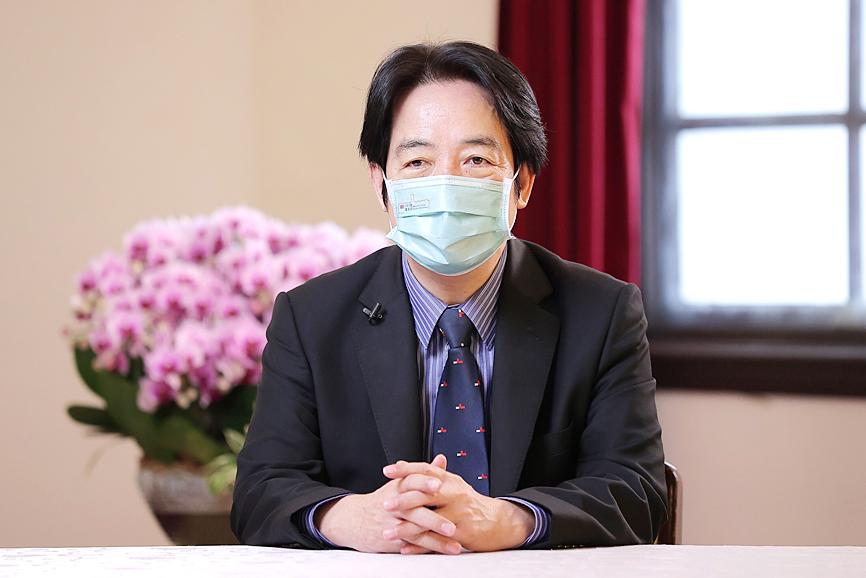Authorities should make use of technological advances in searching for missing elderly people, Vice President William Lai (賴清德) said in a video posted online on Saturday.
Lai’s video is to serve as the opening remarks for the 20th anniversary of the League of Welfare Improvement for Older People.
“I’d like to thank the league for the love it has shown in helping so many elderly people become reunited with their families,” he said.

Photo courtesy of the Presidential Office
Using technology to assist in searching for elderly people who get lost due to dementia or other health conditions is a pressing task, given that Taiwan is to become a super-aged society by 2025, he said.
In the past, families had to rely on filing missing person reports with the police, and posting ads in newspapers and on television to locate missing relatives, Lai said.
“Today, we have smart technology and other online tools at our disposal,” he said. “We need to adapt this technology now, because by 2025 one in five people in Taiwan will be over the age of 65.”
The aging of Taiwanese society combined with an increase in the number of people with dementia means that the number of missing person reports is also rising, he said.
Last year, 2,149 elderly people with dementia went missing, up by 608 reports in 2016, he said.
“What will be most important is not what the government tries on its own, but what the government does in cooperation with social welfare groups,” he said. “As an example, the league has provided families with solid support for 20 years.”
The government should invest in such organizations to improve the efficiency of its efforts, he said.

Taiwan has received more than US$70 million in royalties as of the end of last year from developing the F-16V jet as countries worldwide purchase or upgrade to this popular model, government and military officials said on Saturday. Taiwan funded the development of the F-16V jet and ended up the sole investor as other countries withdrew from the program. Now the F-16V is increasingly popular and countries must pay Taiwan a percentage in royalties when they purchase new F-16V aircraft or upgrade older F-16 models. The next five years are expected to be the peak for these royalties, with Taiwan potentially earning

POSITIVE DEVELOPMENT: Japan and the US are expected to hold in-depth discussions on Taiwan-related issues during the meeting next month, Japanese sources said The holding of a Japan-US leaders’ meeting ahead of US President Donald Trump’s visit to China is positive news for Taiwan, former Japan-Taiwan Exchange Association representative Hiroyasu Izumi said yesterday. After the Liberal Democratic Party’s landslide victory in Japan’s House of Representatives election, Japanese Prime Minister Sanae Takaichi is scheduled to visit the US next month, where she is to meet with Trump ahead of the US president’s planned visit to China from March 31 to April 2 for a meeting with Chinese President Xi Jinping (習近平). Japan and the US are expected to hold in-depth discussions on Taiwan-related issues during the

‘LIKE-MINDED PARTNER’: Tako van Popta said it would be inappropriate to delay signing the deal with Taiwan because of China, adding he would promote the issue Canadian senators have stressed Taiwan’s importance for international trade and expressed enthusiasm for ensuring the Taiwan-Canada trade cooperation framework agreement is implemented this year. Representative to Canada Harry Tseng (曾厚仁) in an interview with the Central News Agency (CNA) said he was increasingly uneasy about Ottawa’s delays in signing the agreement, especially as Ottawa has warmed toward Beijing. There are “no negotiations left. Not only [is it] initialed, we have three versions of the text ready: English, French and Mandarin,” Tseng said. “That tells you how close we are to the final signature.” Tseng said that he hoped Canadian Prime Minister Mark Carney

STAY IN YOUR LANE: As the US and Israel attack Iran, the ministry has warned China not to overstep by including Taiwanese citizens in its evacuation orders The Ministry of Foreign Affairs (MOFA) yesterday rebuked a statement by China’s embassy in Israel that it would evacuate Taiwanese holders of Chinese travel documents from Israel amid the latter’s escalating conflict with Iran. Tensions have risen across the Middle East in the wake of US and Israeli airstrikes on Iran beginning Saturday. China subsequently issued an evacuation notice for its citizens. In a news release, the Chinese embassy in Israel said holders of “Taiwan compatriot permits (台胞證)” issued to Taiwanese nationals by Chinese authorities for travel to China — could register for evacuation to Egypt. In Taipei, the ministry yesterday said Taiwan